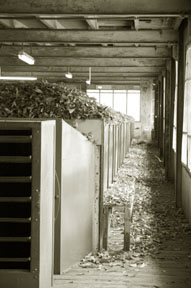|
observer |
|
|
|
|
|
OTHER LINKS |

|

|

|
Bud and ten leavesWhere there is tea, there is hope Now that the crippling strike on tea-estates throughout the country has come to an end life has begun to return to normal, day by day, leaf by leaf...
Until recently two leaves and a bud.. two leaves and a bud... used to be the mantra of the tea pluckers in the up-country tea estates. But since the strike demanding a wage increase of Rs. 300 came to a halt last week with employers agreeing to pay an all inclusive wage of Rs. 260 utter chaos seems to reign in most factories, with the golden rule of plucking only the bud and two leaves momentarily forgotten. "The leaves have over grown on the tea bushes. We can't find two leaves and a bud to pluck" says Rajalechchami. "It is difficult to pluck these leaves because they are mature. At the end of the day our fingers are scratched and bleeding and we find it hard to do our daily chores like cooking and gathering firewood with our hands". But she and her colleagues are happy to be back on the fields, happy to be back at work. "It was sad to look at the leaves maturing on the bushes while we were asked not to report for work by the thalaivers (Union Leaders). It was strange to stay at home doing nothing the whole day". Continues Rajalechchami."We watched Shakthi TV most of the time, but even this became boring after the first few days". While the women remained at home, most men had ventured out of the estates looking for work. Some had found temporary employment as daily paid labourers in the potato farms in Nuwara Eliya. "They paid us Rs. 400 per day. But the work was difficult and we had to work non stop for eight hours" says Thiagaraja.
He sees this experience as an eye opener. "I realized being employed as a labourer on the estate is better. The work is not that tedious because I have to work only till twelve noon every day". Explains Thiagaraja. Factories which had till now had an average intake of about 10,000 kg of green leaf per day is now handling almost 30,000 kg of over grown leaf. Group Manager, Nishantha Abeysinghe of Thalawakelle Tea Estates Limited says hitherto he has never experienced such massive amounts of crop in all his career. The troughs in the factory are overloaded with leaf. "When todays leaf is brought in there is no space for them because yesterdays leaves are still on the troughs". Explains Abeysinghe. "There is lots of fibre which has to be thrown away due to the poor quality of the leaves". According to Abeysinghe the one plus point in the whole scenario is the enthusiasm of the staff. The factory staff has taken this massive intake of crop as a challenge. Even though they have to put in long hours of work they are determined not to let the leaf go waste. "I have been working almost fifteen hours at a stretch" says P. Balakrishna, Factory Officer. But he is grateful to his colleagues in the office who had volunteered to help giving the factory staff a well earned rest. Administrative Officer Nihal Amarasekara says he has been taking turns to do the night-shift to help his colleagues in the factory and will continue to do so until the backlog ends. Assistant Mangers of the estates like Channa Ikiriwatte and Waruna Wijekoon are relieved that the agony of going to work every morning at six to be greeted by empty Muster sheds to realize no one will turn up for work today too, which had been the norm during the past few weeks, is finally over. Everyone in the industry has their fingers crossed hoping the tea manufactured with such hard work will featch good prices which would cover the losses incurred during the period of the strike. "We hope to finish plucking all the mature leaves as soon as possible to prepare the fields for the quality season which begins in mid February and continues till early March. In spite of this set back due to the strike, we are hoping for a good Dimbulla quality season." says Abeysinghe. "With increased wages the COP has increased by Rs. 22 per 1 kg, in toto next year the COP will rise to about Rs. 210, and we are hoping the selling price would off-set the increase in cost". With the backing of Brokers like Yshan Fernando of Forbes and Walker who have pledged their full support in getting reasonable prices for the teas that are now being manufactured the plantation community, from the tea pluckers to the Chief Executive Officers, is determined to greet the new year with forward looking thoughts. Their expectations will surely be fulfilled, for, as the saying goes "where there is tea, there is hope". |












